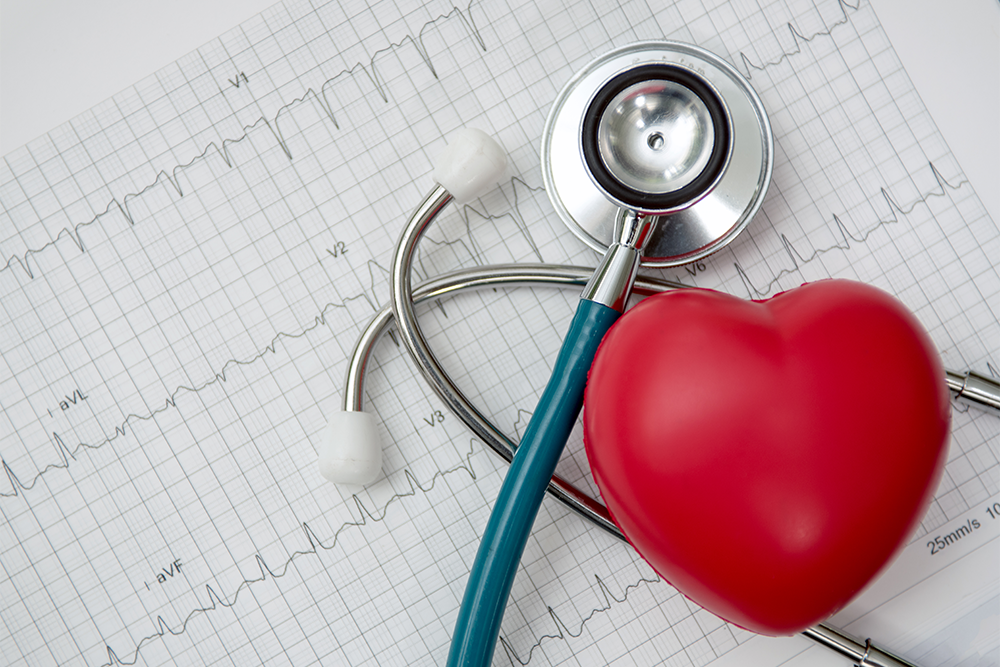The human heart beats about 115,000 times each day while it pumps 5,600-7,500 litres of blood throughout the body daily.
Cardiovascular diseases, comprising various conditions affecting the heart and blood vessels, can cause significant health hazards if left unchecked or untreated.
Gleneagles Hospitals offer a spectrum of diagnostic and screening procedures to detect cardiovascular diseases at an early stage so that suitable lifestyle changes or medical treatments can be implemented to prevent complications.

Diagnostic Tests for Heart Conditions
Blood tests | Blood tests (full blood count, lipid profile, glucose, urea, and electrolytes) are performed to rule out other causes of heart symptoms and measure various levels within the body that may affect the heart. |
Electrocardiogram (ECG) | Your doctor will conduct an electrocardiogram or ECG test if you are suspected to be experiencing symptoms of a heart attack, coronary heart disease, arrhythmia (irregularities in heart rhythm), or if you have received a diagnosis of a heart condition, and also before and during the administration of certain medications. During an ECG test, sensors are affixed to the skin to measure the rhythm and electrical activity of the heart. The type of ECG test to be conducted will depend on your symptoms and the suspected heart condition. The resting ECG is conducted while you are lying down in a comfortable position. The stress or exercise ECG is conducted while you are using an exercise bike or treadmill. During an ambulatory ECG, electrodes are connected to a small portable machine worn around your waist, neck, or shoulder to monitor your heart at home for one or more days. |
Holter monitor | A Holter monitor functions as a portable ECG device. This battery-powered device is about the size of a small camera. It has wires with small electrodes that adhere to the skin to allow continuous ECG recording. Worn around the shoulder, neck, or waist using a strap, your heart’s activity for 24 to 48 hours or more is measured and recorded depending on the type of monitoring. |
Stress test | A stress test is conducted to evaluate your heart’s function when it is pumping hard while you are on a treadmill or stationary bicycle. This test is performed to determine the risk of a heart attack, identify heart-related cause of symptoms like chest pain, shortness of breath, or light-headedness, establish a safe threshold for physical activity, and assess the efficacy of interventions to enhance coronary artery blood flow in individuals with coronary artery disease. |
Nuclear stress test | A nuclear stress test is an imaging procedure that uses a small amount of radioactive substance that is injected into the vein and images of the heart are captured to show the extent of blood flow into the heart muscle during periods of rest and activity. If you exhibit heart disease symptoms, your cardiologist may suggest a nuclear stress test to provide a coronary artery disease diagnosis or design an effective treatment strategy. |
Echocardiogram (Echo) | An echocardiogram or “echo” is a type of ultrasound scan that examines the heart’s structure and functions. During the scan, a small probe emits high-frequency sound waves that generate echoes upon bouncing off various the heart’s structure. The echoes are then picked up by the probe and transformed into a moving image displayed on a monitor during the scan. |
Transoesophageal adult echocardiogram (TEE) | TEE is a test in which an ultrasound transducer is inserted into the oesophagus to take images of the heart. In comparison to standard echocardiograms, TEE provides clearer images of the ascending aorta, the upper chambers of the heart, and the valves between the upper and lower chambers. |
Implantable loop recorder (ILR) | The implantable loop recorder (ILR) is a subcutaneous (beneath the skin of the chest) monitoring device used for prolonged monitoring of the heart’s electrical activity. It collects continuous data compared to the snapshot of electrical activity provided by ECGs. |
Coronary angiogram | A coronary angiogram is a specialised X-ray test that shows whether your coronary arteries are obstructed or narrowed. |
Cardiac computerised tomography (CT) scan | A cardiac CT scan is a non-invasive alternative similar to an X-ray procedure. This scan examines the coronary arteries for blockages and abnormalities that obstruct blood flow that may lead to chest pains (angina) or heart attacks. |
Cardiac magnetic resonance imaging (MRI) | A cardiac MRI is a non-invasive test that uses a magnetic field and radiofrequency waves to generate highly detailed images of your heart and arteries. It is typically performed for individuals with more advanced or complex heart conditions. |
Electrophysiology study | Electrophysiology studies (EP studies) are tests conducted to help doctors comprehend the underlying cause of abnormal heart rhythms, known as arrhythmias. |
Treatments for Cardiovascular Diseases
There are different treatment approaches for cardiovascular diseases depending on the specific condition and its severity.
Lifestyle changes or modifications are an important approach, which include adopting a healthy diet low in saturated fats, cholesterol, and sodium, incorporating regular exercise, maintaining a healthy weight, quitting smoking, limiting alcohol intake, managing stress, getting adequate sleep, and managing other health conditions such as diabetes.
Medications may be prescribed for certain cases. These medications include statins and other cholesterol-lowering medications to control cholesterol levels, blood pressure medications to manage hypertension (high blood pressure), antiplatelets or anticoagulants to prevent blood clots, medications to control heart rhythm abnormalities, and medications to reduce symptoms such as chest pain or heart failure.
In some cases, invasive procedures or surgeries may be necessary. Coronary angioplasty or percutaneous coronary intervention (PCI) is a procedure whereby a small balloon is inserted into the narrowed artery to push the fatty tissue outwards and facilitate improved blood flow. A metal stent, typically a wire mesh tube, is subsequently deployed in the artery to maintain its openness. Drug-eluting stents that release medications to prevent re-narrowing of the artery may also be used. Learn more about angioplasty.
Coronary artery bypass grafting (CABG) is a bypass surgery (heart bypass). It is a surgical procedure carried out to bypass (go around) blocked coronary (heart) arteries aiming to restore normal blood flow to the heart muscle. This procedure uses healthy blood vessels that are surgically removed from another part of the body, including leg veins or the internal mammary artery. It is then sewn around the affected part that is blocked within the artery. This allows a pathway for blood to flow normally again.
In cases where the heart is severely damaged, a heart transplant may be necessary. This is also the case when the heart fails to adequately pump blood around the body (heart failure) and medications are ineffective. During a heart transplant, the damaged or malfunctioning heart is replaced with a healthy heart from a donor.
Cardiothoracic Surgery
Cardiothoracic surgery is the medical specialty that treats conditions affecting the heart, lungs, trachea, oesophagus, and major blood vessels, which are located in the thoracic cavity (chest). Cardiothoracic surgeons work closely with cardiologists, oncologists, and anaesthesiologists.
Cardiothoracic surgeons perform a range of adult and paediatric heart surgeries, including heart and lung transplants, lung resection, vascular stenting, aortic surgeries, and coronary artery bypass surgeries among others.
Learn more about cardiothoracic surgery.







